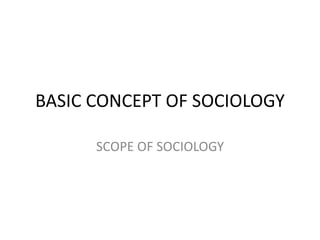
DAY-9 SCOPE OF SOCIOLOGY.pptx
- 1. BASIC CONCEPT OF SOCIOLOGY SCOPE OF SOCIOLOGY
- 2. SCOPE OF SOCIOLOGY • Major two schools of thoughts have given their own opinions to: - Confine the research areas and domain of investigation - Demarcates the boundary for comprehensive understanding of the issue - Systematize the boundary of research with concrete methodology.
- 3. 1. German specialist/ Formalistic school of thoughts • This thought was established by George Simmel, Max, Vierkandt etc. • It aims to confine the areas by including social institutions, facts, dynamics, actions, interactions, process, labor classes, group behavior, and system. • Sociology is pure understanding and independent science. • Sociology should interpret social behavior through cause and effect relationship- Max Weber. • They wanted to study limited contents in depth to make sociological research more scientific.
- 4. 2. French synthetic/informal school of thought • It was founded by Emile Durkheim, sociologist his followers are; Ginsberg, Hob House and P.A. Sorokin. • Their conclusion is that sociology should be encyclopedic in character. • Sociology should include all type of phenomena that exist in society. • Sociological contents can be of vivid, bizarre, formal and informal but the perspective, tools, technique and methodology should be best to make result rational and trustworthy.
- 5. a) Social morphology • It studies the social structure and groups, people’s life, organization and population problems. • The territorial life of the community is studied in depth like High Himalayan ‘sherpa’ mountain ‘magar’ and plain indigenous ‘Tharu’. • Ethnography is produced by researcher here.
- 6. b) Social physiology • Social physiology means; social institutions; marriage, family, kinship, religion, academia, political institutions, economical institutions, socio-cultural entities, laws, language, values, practice, structures, systems are studied sociologically. • According to Emile social structure, systems and its dynamism are basic unit of investigation for sociology.
- 7. c) General sociology • It is regarded as philosophical part of sociology. • It aims to discover general social facts, including, values, norms, practices, morals, ethics, and laws. • It also studies emerging issues like poverty, crime, juvenile delinquency, depression, and disequilibrium of society. • Ginsberg argues there should be contents like pathology, social process, change, structure, system, control, associations, organizations, historical fact and factors of social life are hardware and software of society.
- 8. Conclusion • So both schools of thought seems different to each other but in deep they are supplementary to each other. Most of the scholars agreed that sociology should be encyclopedic in nature and do study the entire social life. But methodology should be concrete and scientific.